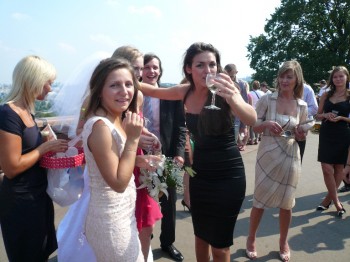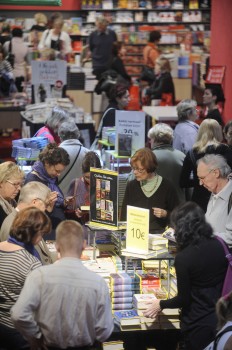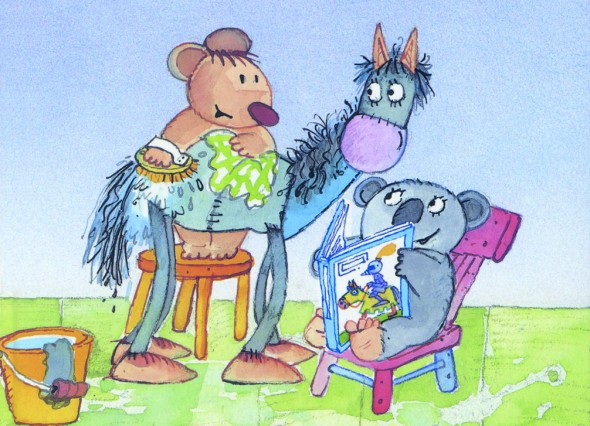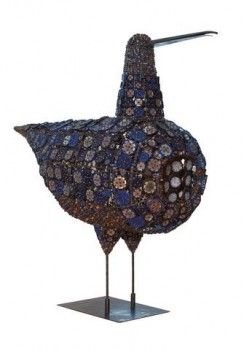Search results for "2011/04/2010/05/song-without-words"
Hotel for the living
30 June 1984 | Archives online, Fiction, Prose
An extract from Hotelli eläville (‘Hotel for the living’, 1983). Introduction by Markku Huotari
Raisa and Pertti are a married couple with three children, Katrielina, Aripertti and Artomikko. When she discovers she is to have another, whom she names Katjaraisa, Raisa decides to have an abortion, because another child, even if welcome, would now jeopardise her career – she has been offered a job with an international company at the very top of the advertising world. Raisa is the successful entrepreneur of the novel – on the one hand coldly calculating, without feeling, on the other superficially sentimental, perhaps the most startlingly ironic of the characters in Jalonen’s novel. His image of the brave new woman?
During her lunch hour Raisa took a walk via the laboratory, asked reception for the envelope and thrust it unregarded into her handbag. She was aware of her already knowing, but short of the envelope, there would as yet be no restrictions, nor were there any decisions that would have to be made. She had called Tom Eriksson, discussed yet again the same points and particulars, and ended tracing a finger over the two beautiful pictures on her wall. ‘The loveliest of seas has yet to be sailed’ and ‘I am life! For Life’s sake.’
She thought of Katjaraisa, her features, the palms the breadth of two fingers, just as Katrielina’s had been, and the same button-eyed gazing look as Katrielina. More…
Keeping up with the Joneskis
17 April 2009 | Extracts, Non-fiction

Toasting the bride: cheerful wedding parties drive up to the Sparrow Hills in Moscow in summer
Moscow-based journalist Anna-Lena Laurén finds the new Russia a promised land of materialism – a place where appearances are everything, and how you pay for maintaining them is a matter of strictly secondary interest
‘I want to go to the nightclub by boat! Come on, let’s hire one,’ Ilya says, heading towards the shore where a boat for at least twenty people is moored. There are six of us.
After two minutes of negotiation, he takes up his position alongside the gangway. He welcomes us onboard with a chivalrous gesture. We step onto the boat and are gently taken off down the Moyka canal in the white night of St Petersburg in June. The sky is pale pink and dark blue-lilac, the air damp and cold, but the captain hands out rugs to keep us warm. The ornamented bridges and pastel-coloured façades of St Petersburg glide past in a faint glow, it’s just light enough to make out the colours, powdery pink, vanilla yellow, pale blue. More…
No place to go
30 March 2008 | Archives online, Fiction, Prose
Extracts from the novel Lakanasiivet (‘Linen wings’, Otava, 2007)
The clothesline swayed in the wind. Helvi closed her eyes and felt herself flutter into the air with the laundry. She flapped her white linen wings, straining higher, now seeing below the whole small peninsula city, its damp rooftops glittering in the morning sun, the blue sighs of the chimneys, the steamboats toiling on the lake and the trains chugging on their tracks. The whole of heaven was clear and blue; only far off in the east were there white pillars roiling – whether smoke or clouds, Helvi could not tell.
She flew north on her linen wings and saw the great bridges leading to the city, on whose flanks the hidden anti-aircraft batteries gasped the fumes of gun oil and iron, and continued her journey over the land, following the straight lines of the telephone wires. She flew over wooded hills and deep green fields, finally arriving on the slope of the great hill where her daughter now lived, in hiding from the war. More…
For love or money
30 June 1994 | Archives online, Fiction, Prose
Extracts from the novel Paratiisitango (‘Paradise tango’, WSOY, 1993). Introduction by Markku Huotari
The bishops’ dilemma
They are waiting for Blume in the front room of the office. On the sofa sits a man whom Blume has never learned to like. He himself chose and appointed the man, for a job not insignificant from the point of view of the company. Blume has good reasons for the appointment. If he employed only men he liked, the business would have gone bankrupt years ago.
Reinhard Kindermann gets up from the sofa and waits in silence while Blume hangs up his overcoat. Mrs Giesler stands next to Blume. She does not try to help her superior take off his coat, for she knows from experience that he would not tolerate it, but the old man does allow her to stand next to him and wait in silence, like a servant expressing submission. More…
Fair game
23 October 2009 | This 'n' that

Words for sale: Helsinki Book Fair, 2009. - Photo: Suomen Messut / Kimmo Brandt
The Helsinki Book Fair opened yesterday (22 October), with the theme ‘What’s really happening’, at the Helsinki Exhibition and Convention Centre. Over four days there will be more than a thousand performers (mostly writers and their interviewers) and nearly 300 exhibitors. Last year’s Fair attracted 68,000 visitors.
The words of the theme are borrowed from a 1960s collection of poems (Mitä tapahtuu todella) by Pentti Saarikoski (1937–1983). According to the press release, the theme ‘sums up what literature is about’; moreover, ‘fiction and non-fiction reflect this very day, reinterpreting the past and present glimpses of what is to come’.
What’s really happening, it seems to us, is that inventing catchy titles for commercial purposes is an enterprise that should be undertaken with caution, as it may produce unintentional connotations for the delectation of those in the know… Mitä tapahtuu todella – its title borrowed in turn from none other than the Russian revolutionary Vladimir Ilyich Lenin – was a politically utopian collection in which Saarikoski expressed his belief in dialectical materialism and communism, contrasting American avant-garde art with the Marxist-Leninist utopia in which the writer wished to live.
In recognition of bicentennial 1809, the year in which Finland ceased to be part of the kingdom of Sweden and became an autonomous Grand Duchy of Russia, Sweden is under focus at the Book Fair, and is represented by 27 exhibitors and more than 30 performers. Writers from eight countries in all will visit the Fair, Russia taking part for the first time. Among the visitors are the writers Andrei Astvatsaturov and Herman Sadullajev and the translators Lyudmila Braude ja Anna Sidorova, who were awarded this year’s Finnish Government Prize for Translation.
The Fair is organised by The Finnish Fair Corporation in conjunction with the Finnish Book Publishers Association and the Organisation of the Booksellers Association of Finland.
The nursemaid
Lapsenpiika (‘The nursemaid’), a short story, first published in the newspaper Keski-Suomi in December, 1887. Minna Canth and a new biography introduced by Mervi Kantokorpi
‘Emmi, hey, get up, don’t you hear the bell, the lady wants you! Emmi! Bless the girl, will nothing wake her? Emmi, Emmi!’
At last, Silja got her to show some signs of life. Emmi sat up, mumbled something, and rubbed her eyes. She still felt dreadfully sleepy.
‘What time is it?’
‘Getting on for five.’
Five? She had had three hours in bed. It had been half-past one before she finished the washing-up: there had been visitors that evening, as usual, and for two nights before that she had had to stay up because of the child; the lady had gone off to a wedding, and baby Lilli had refused to content herself with her sugar-dummy. Was it any wonder that Emmi wanted to sleep? More…
The light itself
31 March 2008 | Archives online, Essays, On writing and not writing
What should you do when writer’s block strikes? Lie down and wait for inspiration to return, Petri Tamminen suggests
All autobiographical depictions of writer’s block are fundamentally flawed and false. If you happen to be suffering from writer’s block, these accounts make for painful reading.
The wittier, more carefully crafted and closely observed an account the writer gives of his affliction, the more gut-wrenching it feels. It’s like treading water and preparing to drown and having to listen to someone in dry clothes standing on the deck of a ship recalling a close call he had back in the seventies.
On the other hand, when you’re suffering from writer’s block everything annoys you. Good books seem overwhelmingly good, so much so that you realise you can never achieve that level of greatness. Similarly, bad books seem so overwhelmingly bad that you wonder why anyone bothers reading books and realise that it’s pointless trying to write one. More…
‘ware bears!
30 September 1988 | Archives online, Children's books, Fiction

Illustration: Jukka Lemmetty
Urpo and Turpo are a pair of teddy bears. Their family – mother, father and three children – cannot imagine who it is that makes such a mess; the bears live their own absorbing lives in house. Hannele Huovi’s text and Jukka Lemmetty’s illustrations describe the bears’ antics in a way that appeals to the sense of humour of readers of all ages.
In the green house an ordinary family are living a perfectly ordinary life. There’s father, mother, The Big Daughter, The Son, and also The Baby as well. Mother keeps running back and forth all day long shouting, ‘Goodness gracious! Who’s responsible for this?’ For very funny things keep going on in the house. Who on earth is it – always getting up to some sort of hanky-panky?
Father harrumphs and says to The Big Daughter:
‘It was you, wasn’t it?’ But The Big Daughter shakes her head. Father turns to The Son:
‘So it must have been you, then?’ But the son shakes his head. No use asking The Baby. He shakes his head anyway, because he’s always imitating the others. Father and mother are completely stumped. More…
Indebted to the centuries
30 September 2007 | Archives online, Fiction, poetry
Poems from Jouni Inkala’s Minuutin ja sen puolikkaan laajenevassa universumissa. Valitut runot 1992–2007 (‘In a minute and its half’s expanding universe’, WSOY, 2007)
Tail references
Mice don’t know that in the case of a human being
the death of a dear one may paralyse
a person’s capacity for years and years.
But in two things they’re more experienced than we.
They understand they’re in constant mortal danger.
That the trap is swift and silent.
That poison is a tear of awareness rising from the heart.
They also realise that in a cat’s claws they fly
like jackknives in the hands of a knife thrower.
And that when the audience finally gets round
to wakening up their hand~ in a rising storm of applause,
they won’t be distinguishable from the arena spotlights
or the ringmaster’s tails.
After their full term of service the mice pass out
from this time to the other side, and there see a miracle:
the sun’s heart beating six hundred times a minute.
In Helsinki, recalling
the Pinder Circus
Brainstorm
30 September 2007 | Archives online, Essays, On writing and not writing
The poet Jouni Inkala finds the words-to-be of his slowly forming poems unbribable
My little fingertip, the size of a crocodile brain, and a turpentine-taste on my palate monitor this moment on the unoxygenated planet of weariness.
One will be baptised – spray paint suddenly swishing its message in my brains – as often in my life, with something darker than water freezing in the font, and I'll recall it's actually a donkey's-years-old message from my own stanzas. More...
The lady who could fly
30 June 1989 | Archives online, Fiction, Prose
A short story from Kenkää suurempi jalka (‘The foot bigger than the shoe’, 1992)
A day came when she felt she could fly. You used technological gear and gadgets for flying, or meteorological shifts in the air masses: rising currents gave you a weightless ecstasy with the lightest of equipment. But that wasn’t it.
To begin with it was one of those typical flying dreams, which gradually extended into the waking state: she could feel it coming in her sinews, her nervous system, her cortex. She was acquainted with Freud and Jung and the other dream-interpreters of today. Characters in the myths and fairytales flew; cruel princesses flew on the wings of the storm; Gogol’s overcoats, Chagall’s lovers, cows and cats flew; and vampires – those last leather-winged flutterings of the prehistoric archaeopterix in the mud of the gene pool. More…
Year of the cat
13 November 2014 | Fiction, Prose
Extracts from the novel Kissani Jugoslavia (‘Yugoslavia, my cat’, Otava 2014). Introduction by Mervi Kantokorpi
I met the cat in a bar. And he wasn’t just any cat, the kind of cat that likes toy mice or climbing trees or feather dusters, not at all, but entirely different from any cat I’d ever met.
I noticed the cat across the dance floor, somewhere between two bar counters and behind a couple of turned backs. He loped contentedly from one place to the other, chatting to acquaintances in order to maintain a smooth, balanced social life. I had never seen anything so enchanting, so alluring. He was a perfect cat with black-and-white stripes. His soft fur gleamed in the dim lights of the bar as though it had just been greased, and he was standing, firm and upright, on his two muscular back paws.
Then the cat noticed me; he started smiling at me and I started smiling at him, and then he raised his front paw to the top button of his shirt, unbuttoned it and began walking towards me. More…
A rare bird from Fancyland
20 August 2013 | Reviews

Bead-covered curlew, 1960. Height ca. 115 cm, Collection Kakkonen. Photo: Niclas Warius
Harri Kalha:
Birger Kaipiainen
Helsinki: Suomalaisen Kirjallisuuden Seura (The Finnish Literature Society), 2013. 249 p., ill.
(Summaries in Swedish and English)
ISBN 978-952-222-457-6
€46, hardback
Ceramics confectioner. Degenerate aristocrat. Ornamental criminal. These epithets can be found in Birger Kaipiainen, a new, full-length study of the ceramic artist by art historian Harri Kalha.
Throughout his artistic career Birger Kaipiainen (1915–1988) worked with forms, subjects and methods that were unfamiliar in the field of traditional ceramics, at least in mid-20th-century Finland, and made use of fantasy and ornament. As a ‘porcelain painter’ he showed little interest in the technical challenges of clay – although in his ceramic creations Kaipiainen explored three-dimensional form, montage, colour, texture and the tactile dimensions of the medium. More…
A brush with death
30 September 2000 | Archives online, Fiction, Prose
From the collection of short prose Hyväkuntoisena taivaaseen (‘Getting to heaven in good shape’, Tammi, 1999)
I had agreed to meet Death at the Assembly Rooms in the centre of Helsinki. Seldom has an interview made me feel so nervous beforehand. Luckily, this gave me a good reason to cancel an appointment with my dentist. (Although of course I know that in the end I shall have to go there myself.)
It is customary to regard Death as a man who is not affected by the whims of fashion. Thus it is surprising to hear that Death is particularly concerned about his public image. ‘In public, I am considered stern and unbending. Unchanging and therefore uncontrollable,’ Death thunders. ‘This is not at all accurate. Fortunately, people understand me better when I am at work. More…

